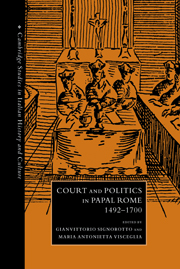Book contents
- Frontmatter
- Contents
- List of abbreviations
- Introduction
- 1 A turning-point in the history of the factional system in the Sacred College: the power of pope and cardinals in the age of Alexander VI
- 2 Court and city in the ceremony of the possesso in the sixteenth century
- 3 ‘Rome, workshop of all the practices of the world’: from the letters of Cardinal Ferdinando de' Medici to Cosimo I and Francesco I
- 4 The ‘world's theatre’: the court of Rome and politics in the first half of the seventeenth century
- 5 Factions in the Sacred College in the sixteenth and seventeenth centuries
- 6 The Secretariat of State as the pope's special ministry
- 7 The cardinal-protectors of the crowns in the Roman curia during the first half of the seventeenth century: the case of France
- 8 The squadrone volante: ‘independent’ cardinals and European politics in the second half of the seventeenth century
- 9 Roman avvisi: information and politics in the seventeenth century
- 10 Hegemony over the social scene and zealous popes (1676–1700)
- Index
- CAMBRIDGE STUDIES IN ITALIAN HISTORY AND CULTURE
10 - Hegemony over the social scene and zealous popes (1676–1700)
Published online by Cambridge University Press: 09 July 2009
- Frontmatter
- Contents
- List of abbreviations
- Introduction
- 1 A turning-point in the history of the factional system in the Sacred College: the power of pope and cardinals in the age of Alexander VI
- 2 Court and city in the ceremony of the possesso in the sixteenth century
- 3 ‘Rome, workshop of all the practices of the world’: from the letters of Cardinal Ferdinando de' Medici to Cosimo I and Francesco I
- 4 The ‘world's theatre’: the court of Rome and politics in the first half of the seventeenth century
- 5 Factions in the Sacred College in the sixteenth and seventeenth centuries
- 6 The Secretariat of State as the pope's special ministry
- 7 The cardinal-protectors of the crowns in the Roman curia during the first half of the seventeenth century: the case of France
- 8 The squadrone volante: ‘independent’ cardinals and European politics in the second half of the seventeenth century
- 9 Roman avvisi: information and politics in the seventeenth century
- 10 Hegemony over the social scene and zealous popes (1676–1700)
- Index
- CAMBRIDGE STUDIES IN ITALIAN HISTORY AND CULTURE
Summary
The growth in the number of studies on the Roman curia, of which the present book is an example, has increasingly shed light on the specific characteristics of a court in which the sovereign was elective and elderly and, therefore, destined to reign for a short – sometimes very short – period of time. Although pontiffs, like other European sovereigns, could consider themselves superior to everyone else, this was not true of their families or, in particular, their heirs. Indeed, after the death of a pope, his relatives were, as it were, downgraded from their status as members of a reigning house to that of simple nobles. Moreover, the election of a new sovereign often meant open season for the settling of old scores, invariably at the expense of the deceased pope's nephews and more faithful relations.
The movements and divisions of the curia's internal factions had to conform to this particular configuration. As Reinhard has explained, the composition of these antagonistic factions in the court reflected the transitory nature of the title of ‘reigning family’, which could only be boasted by a single house, and the fact that it would soon be handed over to another. This made any triumph over rival factions extremely fragile, and effectively ensured that the next victory would go to the coalition of groups which had been defeated in the previous conclave.
- Type
- Chapter
- Information
- Court and Politics in Papal Rome, 1492–1700 , pp. 229 - 246Publisher: Cambridge University PressPrint publication year: 2002
- 1
- Cited by



